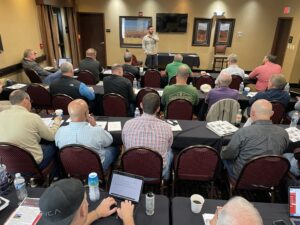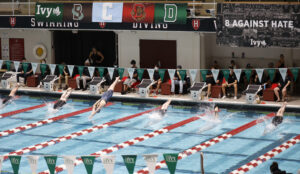
MULKEYTOWN, Ill. (BP)–God doesn’t care about sports, so there’s no sense in athletes kneeling to pray when they score a touchdown or pointing heavenward when they hit a home run.
Such is the case Dan McGraw makes in a recent article at www.salon.com. When the story showed up in my e-mail, I immediately had a couple of presuppositions.
First, when I saw the headline “Stop the holy showboating,” I assumed the writer would take a negative approach to athletes who display their religious beliefs on the playing field. Second, considering the source (the website, not the writer), I figured the article would be illogical, baseless and ooze of political correctness.
My first assumption was correct. My second one, surprisingly, was not. At least, not entirely.
McGraw’s article was both well-written and thought-provoking. His main argument is this: Prayer should be banned on the playing field because it’s nothing more than an attention-grabbing technique.
He made some good points. I agree that some athletes take their religious demonstrations to extremes, perhaps using their supposed piety to catch more of the TV cameras.
But I have to disagree with McGraw about the foundation upon which he builds his argument — that God doesn’t care about sports.
“So please, all of you jocks who feel the need to pray in front of 70,000 people and millions more on TV, do as the scripture tells you. Pray in private,” McGraw wrote. “We all know how God has blessed you and how wonderful you are. But God does not care if you score a touchdown. He does not care if you sack the quarterback.”
Doesn’t he? I always thought that God took an interest in the entirety of his creation, not just the areas we like to compartmentalize as the sacred sphere. No, that doesn’t mean God is directly involved in determining the outcome of sporting events. But I do think that God cares about more than we often think he cares about.
In the movie “Chariots of Fire,” Scottish runner Eric Liddell made the statement that God made him fast, and that Liddell could feel God’s pleasure when he ran.
Richard Mouw, president of Fuller Theological Seminary, also addressed this matter in a recent interview in Christianity Today.
“Obviously, I don’t know whether Barry Bonds is going to end up in heaven, but I think God likes it when he sees him hit a really fine home run,” Mouw said. “And I don’t know whether Tom Hanks is going to end up in heaven, but I do believe that when I take delight in a good acting performance that I’m taking delight in something that God wants me to, that God himself delights in.”
Most athletes, when they thank God following a victory or bow for a moment of prayer following a touchdown, are not saying that God allowed them to win because he likes them better than the other team. Most athletes are simply acknowledging that God is the one who has blessed them with the tremendous ability they have.
McGraw, however, doesn’t agree with that assessment.
“It is curious that athletes feel the need to pray more so than, say, accountants,” McGraw wrote. “I know of no accountants who point to the heavens after they balance their ledgers. I do not kneel after writing a good sentence.”
Nor do I. But maybe that’s more of an indictment on us. Maybe a lot of us could stand to follow the examples of some of these athletes who so readily credit God with their success.
–30–
Ellsworth is a regular columnist on BP Sports, at www.bpsports.net.















